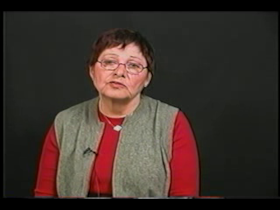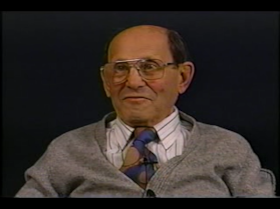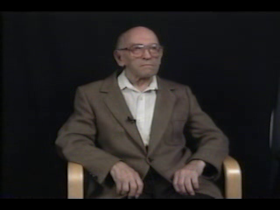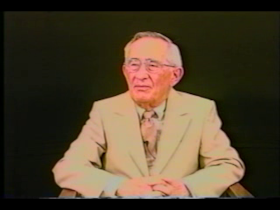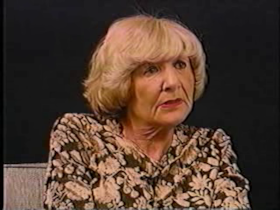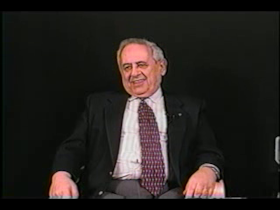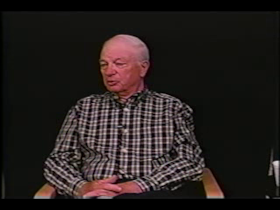Narrow Results By
Place
- Bedzin, Poland, Europe 1
- Janow Lubelski, Poland, Europe 1
- Jarnice, Wegrow, Poland, Europe 1
- Klimontów, Poland, Europe 1
- Lodz , Poland , Europe 1
- Lodz, Poland, Europe 2
- Mezrich, Poland, Europe 1
- Paberze, Lithuania (Poland), Lithuania (Poland), Europe 1
- Parczew, Poland, Europe 1
- Piotrkow Trybunalski, Poland, Europe 1
- Pruzana , Belarus (Poland), Europe 1
- Siemiatycze, Poland, Europe 1
Cieply, Isak - Oral History of a Holocaust Survivor
https://www.cjhn.ca/link/cjhn67767
- Collection
- WITNESS TO HISTORY COLLECTION (MHMC-02)
- Description Level
- Item
- Material Type
- moving images
- Physical Description
- 02:26:32
- Collection
- WITNESS TO HISTORY COLLECTION (MHMC-02)
- Description Level
- Item
- Material Type
- moving images
- Physical Description
- 02:26:32
- Language
- English
- Notes
- Isak Cieply was born on February 1, 1924 in Starachowice, Poland. He had five siblings and the family was very poor. In the fall of 1939, soon after the German invasion, the Jews of Starachowice were ordered to move into the ghetto. Isak was selected to work in a steel factory and his work pass protected him from round-ups. At the beginning of 1943 he was sent to the Bugaj camp to work in a supplies warehouse. In the summer of 1944 the camp was liquidated after rumours of the approach of the Soviet army had spread. The prisoners were taken to Auschwitz. Isak was sent to work in an electric supplies warehouse in Buna/Auschwitz III. There he met a German soldier who proposed a deal that Isak accepted. Isak was to supply this soldier with electric materials and, in return, he would get a loaf of bread every day. In January 1945 Isak was sent on a death march to the Flossenbürg concentration camp. Sometime later he was sent on another death march but succeeded to escape with some fellow prisoners. They eventually met American soldiers. After liberation Isak worked as the chief supplier of the Pfarrkirchen and Eggenfelden DP camps. He immigrated to Canada in 1948 and married the late Regina Cieply who was also a survivor. They had four children and several grandchildren, among them Jamie Benizri.
- Accession No.
- WTH-213
- Name Access
- Cieply, Isak
- Archival / Genealogical
- Archival Descriptions
- Repository
- Montreal Holocaust Museum
Images
YouTube
Cieply, Isak - Oral History of a Holocaust Survivor
https://www.youtube.com/embed/eIbnIGm8Rg8Cohen, Matla - Oral History of a Holocaust Survivor
https://www.cjhn.ca/link/cjhn60312
- Collection
- WITNESS TO HISTORY COLLECTION (MHMC-02)
- Description Level
- Item
- Material Type
- moving images
- Physical Description
- 01:28:09
- Collection
- WITNESS TO HISTORY COLLECTION (MHMC-02)
- Description Level
- Item
- Material Type
- moving images
- Physical Description
- 01:28:09
- Language
- English
- Notes
- Matla Cohen was born November 15th, 1934 in Mezrich, Poland. She comes from a family of six that include two sisters and one twin brother. The pre-war period is somewhat unfamiliar to her due to her very young age, but her first real awareness of the war was when she and her family had to hide out in the garden after areas around her home were bombarded. In 1939-40, she and her family had been relocated to Vitebsk, Belarus. Her parents worked in a factory and she was in a nursery with her brother. Once more, they were forcefully relocated to a labour camp in Siberia. Her parents worked early and returned at night, while Matla was placed in a barrack and became caretaker of her siblings. She recalls her time there as being: “very difficult”. Ultimately, her family escaped the barrack as her father bribed a commandant with the prospect of a tailored suit. They finally got to an area in the Caucasus Mountains where they lived until the war ended. After the war, they returned back to Poland. They lived there for a month where the Madrichim approached their parents in hopes of sending Anne to Israel. She was separated from her family and sent to a DP camp in Berlin, awaiting the transport to Israel. In the end, that never took place as she jumped from camp to camp until a French Canadian woman in one of them suggested that she move to Montreal; a suggestion she followed in 1948. In Canada, she was adopted by a local family in Ste. Agathe and lived there until she attended college at the age of 18 in Montreal. She would visit her family in Ste. Agathe most weekends, and that is where she met her first husband; a marriage which lasted ten years. A few years later she met her second husband, Benjamin, to whom she is still married. She has five children.
- Accession No.
- WTH-448
- Name Access
- Cohen, Matla
- Places
- Mezrich, Poland, Europe
- Archival / Genealogical
- Archival Descriptions
- Repository
- Montreal Holocaust Museum
Images
Dawidovicz, David - Oral History of a Holocaust Survivor
https://www.cjhn.ca/link/cjhn60325
- Collection
- WITNESS TO HISTORY COLLECTION (MHMC-02)
- Description Level
- Item
- Material Type
- moving images
- Physical Description
- 02:48:00
- Collection
- WITNESS TO HISTORY COLLECTION (MHMC-02)
- Description Level
- Item
- Material Type
- moving images
- Physical Description
- 02:48:00
- Language
- French
- Notes
- David Dawidovicz was born on July 17, 1924 in Lodz, Poland. Soon after, his family moved to Tel-Aviv, Israel, where they stayed until 1931. At that point, they moved to Paris because of endemic poverty in Tel-Aviv. After four years in France, David, his mother and two of his sisters were expelled from France because they were illegal immigrants, unlike David’s father. David remembers the train journey through Germany, seeing lots of swastikas on buildings and on uniforms. He and his relatives spent six months in Lodz. There, David realized that Jews in Poland weren’t as emancipated as Jews in France. Back to France, David attended school until the war began. In 1941 and 1942, he witnessed several roundups. During the Vel d’Hiv roundup of July 1942, he hid in a small apartment with other people. They were able to hide thanks to French policemen who used to warn Jews. David hid for several weeks. He was eventually arrested in August 1942 by French policemen who took him to the offices of the UJF (Union des Juifs français). This organization gave money to the French police to send Jews to work in the Ardennes (a French region) instead of deporting them to Poland. David worked there until January 1944, at which point he decided to escape and join the resistance. He partook in the liberation of Paris. After the war, David took part in a program to de-Nazify the German youth. He lives in Paris to this day.
- Accession No.
- WTH-534
- Name Access
- Dawidovicz, David
- Places
- Lodz, Poland, Europe
- Archival / Genealogical
- Archival Descriptions
- Repository
- Montreal Holocaust Museum
Images
Goldberg, Peter - Oral History of a Holocaust Survivor
https://www.cjhn.ca/link/cjhn60297
- Collection
- WITNESS TO HISTORY COLLECTION (MHMC-02)
- Description Level
- Item
- Material Type
- moving images
- Physical Description
- 00:59:33
- Collection
- WITNESS TO HISTORY COLLECTION (MHMC-02)
- Description Level
- Item
- Material Type
- moving images
- Physical Description
- 00:59:33
- Language
- English
- Notes
- Peter Goldberg was born on May 12, 1919 in Paberze, a village approximately 20 km from Vilnius, Lithuania (Vilna, Poland), where he and his nine siblings were raised in an orthodox Jewish home. The Russian Army occupied Vilnius in 1939 until the Germans took over in 1941. Peter recalls the many restrictions placed on Jews, including the wearing of yellow stars, forced labour, and the establishment of the Jewish ghetto. Peter and his wife had to stay in the ghetto for about seven months. They remained there, often in hiding, until it was liquidated by the German Gestapo. Then, for ten months, they paid to live in a Polish house approximately 10 km from the Ghetto. Peter was taken to do forced labour as a coal digger in Bielawaka ? concentration camp. Once the camp was liquidated, he and his wife had to return to the ghetto in Vilnius for a second time until it closed in 1943. They spent about eight months in the Vilnius HKP-562 concentration camp where Peter was forced to work as a mechanic. The Germans liquidated the camp in July 1944. After liberation by the Russian Army, he and his wife returned home. He knew that most of his family had been killed immediately upon arrival in the ghetto in Vilnius (Vilna). After the war, Peter worked as a baker and a stock keeper of food for the Russian Army. When the borders opened in 1957, Peter, his wife and their daughter immigrated to Poland. They lived there until December 1958 when they decided to immigrate to Canada, as Peter’s sister was living in Montreal. Once here, Peter worked as a butcher and manager of a meat store.
- Accession No.
- WTH-050
- Name Access
- Goldberg, Peter
- Archival / Genealogical
- Archival Descriptions
- Repository
- Montreal Holocaust Museum
Images
YouTube
Goldberg, Peter - Oral History of a Holocaust Survivor
https://www.youtube.com/embed/kd0CWEt_QrcGoldwasser, Sam - Oral History of a Holocaust Survivor
https://www.cjhn.ca/link/cjhn60309
- Collection
- WITNESS TO HISTORY COLLECTION (MHMC-02)
- Description Level
- Item
- Material Type
- moving images
- Physical Description
- 01:35:00
- Collection
- WITNESS TO HISTORY COLLECTION (MHMC-02)
- Description Level
- Item
- Material Type
- moving images
- Physical Description
- 01:35:00
- Language
- English
- Notes
- Sam Goldwasser was born in 1928 in Parczew, Poland. He and his siblings, a younger brother and sister, were raised in a kosher family. He lived in the ghetto until 1942, when his parents gave him away to another family in order to keep him safe. In August 1942, his mother and sister were shot in Parczew and his father and brother were deported to Treblinka where they died. Sam went into hiding in the woods near Parczew with other Jews, joining the partisans. He was the leader of his group as he knew those woods very well. His nickname was “Machine Gun.” His group received orders and armies from the Russians; they blew up trains and roads and they fought against Germans and Polish. They were liberated by the Russians in August 1944. Sam joined the Polish police secret services until March 1946. During the same period, he lived in a kibbutz in the Parczew area. Later, he went to a DP camp in Eschwene, Germany, where he remained under a false identity. In June 1948, he came to Montreal by ship via Halifax, as he had an uncle and an aunt here. He got married in 1949 and they had two children and two grand-children. He worked in the needle trade, pre-retiring in 1983.
- Accession No.
- WTH-373
- Name Access
- Goldwasser, Sam
- Places
- Parczew, Poland, Europe
- Archival / Genealogical
- Archival Descriptions
- Repository
- Montreal Holocaust Museum
Images
Jegergarn, Chaim - Oral History of a Holocaust Survivor
https://www.cjhn.ca/link/cjhn60305
- Collection
- WITNESS TO HISTORY COLLECTION (MHMC-02)
- Description Level
- Item
- Material Type
- moving images
- Physical Description
- 01:59:14
- Collection
- WITNESS TO HISTORY COLLECTION (MHMC-02)
- Description Level
- Item
- Material Type
- moving images
- Physical Description
- 01:59:14
- Language
- English
- Notes
- Chaim Jegergarn was born in Janow Lubelski, Poland in 1912. He and his seven siblings were raised in a poor family. He did not go to school. At only ten years old, he learned to be a tailor. In 1935, he served in the Polish Army for 18 months. He got married in 1937. After Kristallnacht, he escaped with his family to Russia. From there they went to Lvov, Ukraine (Lwow, Poland), where Chaim registered to go to work in Selovalika ?, Russia, where he worked as a tailor. There, they were bombed so they moved by train to a small place in the woods near Yaroslavl. In 1941, he moved to Kozyatyn, Uzbekistan, to work in a factory. Chaim obtained a Russian pass and moved near Tashkent, where he stayed for nearly three years working in the coal mines. He contracted typhus and later worked as tailor in a factory. In 1945, he left Tashkent to return by train to Szczecin, Poland. Except for two brothers, the rest of his family in Poland perished during the Holocaust. From 1946 to 1948, Chaim stayed in a DP camp in Eschwege, Germany. In July 1948, Chaim came to Montreal with his wife, son, daughter, and brother in an effort to begin a new life.
- Accession No.
- WTH-290
- Name Access
- Jegergarn, Chaim
- Archival / Genealogical
- Archival Descriptions
- Repository
- Montreal Holocaust Museum
Images
Kipman, Stella - Oral History of a Holocaust Survivor
https://www.cjhn.ca/link/cjhn60299
- Collection
- WITNESS TO HISTORY COLLECTION (MHMC-02)
- Description Level
- Item
- Material Type
- moving images
- Physical Description
- 01:41:29
- Collection
- WITNESS TO HISTORY COLLECTION (MHMC-02)
- Description Level
- Item
- Material Type
- moving images
- Physical Description
- 01:41:29
- Language
- English
- Notes
- Stella Kipman (née Ginsburg) was born on January 14, 1918 in Slomniki, Poland. Her family moved to Krakow where she completed her education. After marrying, Stella and her husband moved to Sosnowiec. In 1939, about a year and a half after marrying and moving to Sosnowiec, the war broke out and Stella returned to her father in Krakow. She went back to Sosnowiec where she got a job in social service. Stella and her husband were forced to live in the Sosnowiec ghetto; she speaks of how difficult life was during this time, including the many restrictions and being forced to wear a band and yellow star. Between 1943 and 1944, Stella was sent to Katowice labour camp. In January 1944, Stella and her older sister obtained false papers and went to Berlin where she stayed with a housekeeper. However, she was soon discovered and put into prison by German Gestapo to work for several months. Afterwards, they sent her to Birkenau-Auschwitz to clean rooms and cook. In January 1945, Stella and many other camp inmates were sent by transport to a Polish barrack in Ravensbrück. Six weeks before liberation by the French Army, Stella lost consciousness due to a terrible fever – the Polish women in her barracks took care of her because she was the wife of a Polish officer. After liberation, she was taken to a hospital to recover and later returned to Sosnowiec by train. In December 1945, she was flown by a military plane to Paris and from there went to Freiburg for 18 months. Stella and her husband immigrated to Canada in 1951, followed by her only surviving sister.
- Accession No.
- WTH-074
- Name Access
- Kipman, Stella
- Places
- S?omniki, Poland, Europe
- Archival / Genealogical
- Archival Descriptions
- Repository
- Montreal Holocaust Museum
Images
Kleingrib, Annette - Oral History of a Holocaust Survivor
https://www.cjhn.ca/link/cjhn60322
- Collection
- WITNESS TO HISTORY COLLECTION (MHMC-02)
- Description Level
- Item
- Material Type
- moving images
- Physical Description
- 01:00:00
- Collection
- WITNESS TO HISTORY COLLECTION (MHMC-02)
- Description Level
- Item
- Material Type
- moving images
- Physical Description
- 01:00:00
- Language
- French
- Notes
- Annette Kleingrib (née Naparstek) was born in Warsaw, Poland on May 3, 1926. In 1937, the family moved to Paris in search of a better life, free from the pervading antisemitism and economic instability of Poland in the 1930s. Annette’s father had died before the war began, leaving her mother to raise Annette and her six siblings. Her mother remarried to a non-Jewish man in 1937. They went to school in Paris until the war broke out in May 1940. Annette stopped attending school once the wearing of the yellow star was imposed. Curfews and other antisemitic restrictions were enforced. In 1941, the Germans began deporting Jews; Annette’s brother’s, Salomon and Charles, attempted to escape but were caught and sent to Auschwitz. Annette went to Pontelle to go in hiding while her mother remained in Paris, relatively safe under the protection of her husband. In the summer of 1941, Annette was sent to a village in the Massif Central on a bus destined towards Algeria. She remained in Clermont Ferland, a non-occupied town close to Vichy. She returned to Paris that winter, reuniting with her mother and her remaining siblings. After the war, Annette contracted tuberculosis and spent a year and a half recovering at a sanatorium. She married in Paris in 1949; her first daughter was born the following year. They immigrated to Montreal, Canada, in 1960 where they established a fur business.
- Accession No.
- WTH-519
- Name Access
- Kleingrib, Annette
- Places
- Warsaw, Poland, Europe
- Archival / Genealogical
- Archival Descriptions
- Repository
- Montreal Holocaust Museum
Images
Kotkowsky, Charles - Oral History of a Holocaust Survivor
https://www.cjhn.ca/link/cjhn67759
- Collection
- WITNESS TO HISTORY COLLECTION (MHMC-02)
- Description Level
- Item
- Material Type
- moving images
- Physical Description
- 01:09:37
- Collection
- WITNESS TO HISTORY COLLECTION (MHMC-02)
- Description Level
- Item
- Material Type
- moving images
- Physical Description
- 01:09:37
- Language
- English
- Notes
- Charles Kotkowsky was born in Piotrkow Trybunalski, Poland on August 8, 1920. He says that he encountered significant antisemitism growing up. After the German invasion in September 1939, he was made to wear an armband identifying him as Jewish and became afraid to go outside. A ghetto was constructed almost immediately in Piotrkow Trybunalski. Charles worked in a glass factory and was in communication with a Jewish Resistance group. In 1942, he and his brother Shlomo were taken to a nearby labour camp. In November 1944, they were again transferred, first to the HASAG Pelzery, near Cz?stochowa, Poland, and then to Buchenwald in January 1945, where Charles was tormented and humiliated by being forced to strip naked in the freezing cold. Charles was taken on a death march to Floeszberg - a subdivision of Buchenwald - in Febuary 1945. The camp was incomplete, and Charles had to help in its construction. In April the camp was evacuated and the prisoners were placed on a train headed for Czechoslovakia. Along with seven other people, including his brother, Charles jumped off the train and successfully escaped. The group was hidden by sympathetic Czechoslovaks in Plzen, Czech Republic (Czechoslovakia). They were there hiding in a barn when they were liberated by the American Army on May 8, 1945. After the war, Charles mentioned that he was invited to what he described as a “séance,” where he witnessed captured S.S. men being beaten - one of whom was killed. His brother contracted tuberculosis and needed to be moved to a hospital in another town. Unfortunately, Charles could not stay with him in Czechoslovakia for long. He soon moved to a series of DP camps in Italy, working in a doctor’s office. In 1951, he was refused entry into the United States, but was accepted into Canada, arriving there that same year.
- Accession No.
- WTH-068
- Name Access
- Kotkowsky, Charles
- Archival / Genealogical
- Archival Descriptions
- Repository
- Montreal Holocaust Museum
Images
YouTube
Kotkowsky, Charles - Oral History of a Holocaust Survivor
https://www.youtube.com/embed/8hmNmz1HpGoLev, Jacob - Oral History of a Holocaust Survivor
https://www.cjhn.ca/link/cjhn60320
- Collection
- WITNESS TO HISTORY COLLECTION (MHMC-02)
- Description Level
- Item
- Material Type
- moving images
- Physical Description
- 00:47:00
- Collection
- WITNESS TO HISTORY COLLECTION (MHMC-02)
- Description Level
- Item
- Material Type
- moving images
- Physical Description
- 00:47:00
- Language
- English
- Notes
- Jacob Lev was born in 1925 in Warsaw, Poland. He had ten siblings. He attended a Polish school. When the war broke out, he and his family were forced to live within the confines of the Warsaw Ghetto. On many occasions, Jacob would sneak out of the ghetto to look for food; this was known as a “smuggling child”. On one “smuggling” incident in 1942, Jacob was unable to re-enter the ghetto. He decided to run away to Krasnik as he had a cousin there, leaving his family behind. After liberation in 1944 by the Russians, Jacob returned to Warsaw but none of his family survived. He went to Lodz where he met his future wife, Zena.They went to Prague, Pilsen and Salzburg in Austria, and in 1946 they move to Bari, Italy, where they got married and had their first child. They were helped by the UNRRA. In 1948, they moved to Israel where Jacob served in the army and they had their second child. In 1953, they moved to Montreal where they had a third child. Together they ran a fruit store; however, adjusting to a new environment wasn’t easy. Jacob and Zena have one grandson.
- Accession No.
- WTH-481
- Name Access
- Lev, Jacob
- Places
- Warsaw, Poland, Europe
- Archival / Genealogical
- Archival Descriptions
- Repository
- Montreal Holocaust Museum
Images
Lev, Zena - Oral History of a Holocaust Survivor
https://www.cjhn.ca/link/cjhn60319
- Collection
- WITNESS TO HISTORY COLLECTION (MHMC-02)
- Description Level
- Item
- Material Type
- moving images
- Physical Description
- 00:27:00
- Collection
- WITNESS TO HISTORY COLLECTION (MHMC-02)
- Description Level
- Item
- Material Type
- moving images
- Physical Description
- 00:27:00
- Language
- English
- Notes
- Zena Lev (née Lipa) was born in Lodz, Poland on April 18, 1925. She had three siblings. When the war broke out in 1939, she and her family were immediately transferred to Krasnik’s ghetto where they were accommodated by the Jewish committee. Zena stayed there until 1942, working in the fields. Her family was deported to Treblinka (?) in 1941. Zena was transferred to Lublin where she worked in a munitions factory until liberation by the Red Army in January 1945. After the war, she returned to Lodz only to discover that her entire family had perished. There she met her future husband, Jacob. They went to Prague, Pilsen and Salzburg in Austria, and in 1946 they move to Bari, Italy, where they got married and had their first child. They were helped by the UNRRA. In 1948, they moved to Israel where Jacob served in the army and they had their second child. In 1953, they moved to Montreal where they had a third child. Together they ran a fruit store; however, adjusting to a new environment wasn’t easy. Zena found that one of her uncle’s survived the Holocaust and was living in Montevideo. Zena and Jacob have one grandson.
- Accession No.
- WTH-480
- Name Access
- Lev, Zena
- Places
- Lodz, Poland, Europe
- Archival / Genealogical
- Archival Descriptions
- Repository
- Montreal Holocaust Museum
Images
Miller, Harry - Oral History of a Holocaust Survivor
https://www.cjhn.ca/link/cjhn60308
- Collection
- WITNESS TO HISTORY COLLECTION (MHMC-02)
- Description Level
- Item
- Material Type
- moving images
- Physical Description
- 01:34:43
- Collection
- WITNESS TO HISTORY COLLECTION (MHMC-02)
- Description Level
- Item
- Material Type
- moving images
- Physical Description
- 01:34:43
- Language
- English
- Notes
- Harry Miller was born on the 1st of September, 1919 in a village near the town of Wegrow, Poland. He comes from a tight knit family of 11 which include nine siblings, six boys and four girls. Before the war broke out, he went to a public school that he finished by the age of 14-15, and eventually undertook an extra three years of education to become a tailor. While in school, he was part of a Jewish organization that discussed Israel, Jewish life, cultural discovery and the sentiments of antisemitism. He finished his tailor apprenticeship at the age of 19 and opened up his business a few years before the war. Although there was discussion of leaving the country for Russia, he never went along with it as he was so involved with his family and the responsibilities associated to it. Nor did he ever believe that the Germans would start killing off Jews. His first real awareness of the war was in 1941 when Jews in the countryside were forced into the ghettos. While in the Wegrow ghetto, he worked in the hospital helping those with typhoid. In September 1941, the ghetto was liquidated. He was able to hide and eventually escape the liquidation by fleeing to a nearby farm where he worked as a tailor during the day, and jumped from farm to farm at night with a few of his siblings. At that point, he knew that his parents had already been killed at Treblinka extermination camp. By 1944, the Soviets had liberated Poland, and he was taken to a hospital to recuperate. He eventually moved to Lodz with a Schindler survivor and his sister. He stayed there until he heard about the Kielce Pogrom, fled to Berlin, and finally to an American DP camp in which he stayed for a year. In 1947, he immigrated to Canada via ship, arriving in Halifax and eventually settling in Montreal. A week after arriving in Montreal, he found a job as a tailor and made suits on the side for extra income. He opened his own business once more, and got into textile selling/import-export. There he met his wife, got engaged in 1948 and had two sons, Jerry and Norman.
- Accession No.
- WTH-355
- Name Access
- Miller, Harry
- Archival / Genealogical
- Archival Descriptions
- Repository
- Montreal Holocaust Museum
Images
Pitluk, Zulema (Zlatka) - Oral History of a Holocaust Survivor
https://www.cjhn.ca/link/cjhn67772
- Collection
- WITNESS TO HISTORY COLLECTION (MHMC-02)
- Description Level
- Item
- Material Type
- moving images
- Physical Description
- 00:36:33
- Collection
- WITNESS TO HISTORY COLLECTION (MHMC-02)
- Description Level
- Item
- Material Type
- moving images
- Physical Description
- 00:36:33
- Language
- Yiddish
- Notes
- Pitluk, Zulema (Zlatka) was born on September 23, 1924 in Pruzana , Belarus (Poland).
- Accession No.
- WTH-327
- Name Access
- Pitluk, Zulema (Zlatka)
- Archival / Genealogical
- Archival Descriptions
- Repository
- Montreal Holocaust Museum
Images
YouTube
Pitluk, Zulema (Zlatka) - Oral History of a Holocaust Survivor
https://www.youtube.com/embed/AjhenOmDhpARosen, Chaim - Oral History of a Holocaust Survivor and WWII Veteran
https://www.cjhn.ca/link/cjhn60298
- Collection
- WITNESS TO HISTORY COLLECTION (MHMC-02)
- Description Level
- Item
- Material Type
- moving images
- Physical Description
- 01:44:56
- Collection
- WITNESS TO HISTORY COLLECTION (MHMC-02)
- Description Level
- Item
- Material Type
- moving images
- Physical Description
- 01:44:56
- Language
- English
- Notes
- Chiam Rosen was born on December 7, 1918 in the small Polish town of Tomaszow Mazowiecki, to a father who was a ritual slaughterer/cantor/Hebrew teacher and a mother who was a housewife. When he was two, he moved to Magdeberg, Germany. His two brothers were born there, one in 1920 and the other in 1924. He began school in Madgeberg and finished, after another move, in Braunschweig, where he lived until the war broke out. In 1933 he and his brother were kicked out of school. His father took him to a cabinet-maker, where he became an apprentice. He worked there for 3.5 years. When he turned 18 he realized Germany was not the place for him and he obtained a Pioneer Certificate. He was given a certificate to go to Palestine. When he left in July 1937 he was seeing his parents for the last time. He made his way to Palestine via Italy. When he arrived he joined a kibbutz, building defense walls before working as a mounted police defending the towns. Eventually he joined the Palestinian army, was trained under the British army, and served in artillery groups. He was sent to Italy and there he received news of his brothers, both of whom had also joined the army, and his parents, who had been transported to the Warsaw (or Lodz) ghetto. Once the war was over Chiam went from Italy to Austria to Germany and Belgium, helping prisoners from DP camps, bringing food, transporting supplies and trying to help orphaned children. He visited Bergen-Belsen, not as part of the army but with a group of people who wanted to help. Eventually he was discharged and returned to Palestine. On the way he was reunited with one of his brothers. In Palestine he helped in preparation for the Israeli War of Independence, but did not fight in it. He and his brothers contacted their uncle who was living in Montreal, Canada. They were granted visas and emigrated to Montreal. Eventually they moved to Quebec City to work in the scrap metal business. Chiam married in 1954 in Canada. They separated after 40 years with no children.
- Accession No.
- WTH-060
- Name Access
- Rosen, Chaim
- Archival / Genealogical
- Archival Descriptions
- Repository
- Montreal Holocaust Museum
Images
Schichter, Sara - Oral History of a Holocaust Survivor
https://www.cjhn.ca/link/cjhn67771
- Collection
- WITNESS TO HISTORY COLLECTION (MHMC-02)
- Description Level
- Item
- Material Type
- moving images
- Physical Description
- 01:55:21
- Collection
- WITNESS TO HISTORY COLLECTION (MHMC-02)
- Description Level
- Item
- Material Type
- moving images
- Physical Description
- 01:55:21
- Language
- English
- Notes
- Sara Schichter (née Kaminski) was born on January 8, 1925 in a small Polish town called Bedzin, near Sosnowiec. She and her eight brothers were raised in a traditional Jewish. Three of her brothers died before 1924. At the outbreak of the war, the family had relocated to Hasselt, Belgium, where Sara attended elementary school and learned Flemish. In May 1940, the family fled to northern France but was caught up in the fighting in Dunkirk and Calais. They returned to Belgium in October 1940, and spent the rest of the war hiding in four separate houses all in the vicinity of Brussels. Sara lost her mother and three of her brothers who had been deported to Auschwitz. In May 1951, Sara immigrated to Canada, settling in Montreal where she became a teacher. Notably, Sara kept a diary during the war and she refers to it during the interview. Ms. Schichter passed away on May 19, 2013.
- Accession No.
- WTH-326
- Name Access
- Schichter, Sara
- Places
- Bedzin, Poland, Europe
- Archival / Genealogical
- Archival Descriptions
- Repository
- Montreal Holocaust Museum
Images
YouTube
Schichter, Sara - Oral History of a Holocaust Survivor
https://www.youtube.com/embed/0sBGFgcWpNUSeltzer, Martin - Oral History of a Holocaust Survivor
https://www.cjhn.ca/link/cjhn67757
- Collection
- WITNESS TO HISTORY COLLECTION (MHMC-02)
- Description Level
- Item
- Material Type
- moving images
- Physical Description
- 01:26:32
- Collection
- WITNESS TO HISTORY COLLECTION (MHMC-02)
- Description Level
- Item
- Material Type
- moving images
- Physical Description
- 01:26:32
- Language
- English
- Notes
- Martin Seltzer was born Mordechai (Motke) Penczna in Klimontów, Poland on February 2, 1917 to an observant Jewish family. At the onset of the war, Martin had three older sisters who were married, a younger brother and a younger sister. Neither his parents nor any of his sisters survived the Holocaust. The Germans came into Klimontów ten days after the September 1st occupation of Poland. A Judenrat was established, all Jews were ordered to wear an armband with the yellow star, and the Germans began requisitioning resources every second week. The family business was taken over by a Volksdeutch - they could still live in their home, however. In 1940 all Jews from surrounding villages were ordered into the center of Klimontów. In 1942, the Jews in Klimontów received a deportation order. Martin's father asked a Polish farmer, a friend of his, to hide Martin until the war ended. It was understood that he would be compensated for this. One morning the town was full of Ukrainian police - people started to run, Martin included. The Ukrainians were shooting at the fleeing Jews - many of them were killed, but Martin was lucky to make it out of the city unharmed. The rest of his family went together to Auschwitz and were murdered there. Martin hid in a forest until night fell, and then made his way to the farmhouse, where he hid in the stable as arranged. He stayed on the farm for over two years; he would go to the forest if the Germans were near - the farmer's wife was very frightened of being caught hiding a Jew. Martin tells a story about almost being caught in a cellar trying to dig up his family's hidden valuables. In 1944 the Russian army advanced into Klimontów - when Martin heard this, he left his hiding place and went into the city. He took over his family's flour mill and employed some other Jewish survivors; the Russians requisitioned him to make flour to feed the Russian army. After four or five months he was warned by a Russian Jewish soldier that they were moving on and that he should leave the city. Martin wasn't feeling well - he went to Lodz to see a doctor (there were none in Klimontów). He was operated on for appendicitis, and when he left the hospital he learned that the Armia Krajowa had come into his hometown at night and killed all the Jewish survivors living there. He learned that his cousin was living nearby in Opatów; he knew that the AK were active all over Poland and that she was at risk as well. He took the train there and convinced her to leave with him; they lived together in Lodz for about six months. They got in contact with the Bricha, who smuggled them into Czechoslovakia by bribing Russians. From there they crossed into Austria and lived in Linz for a few months in a Jewish refugee camp - it was after May 1945 - the war was already over. Martin and his cousin went to Stuttgart and lived there until 1947. She got in contact with her brother in Canada - he wanted to bring her over but she insisted that Martin had to come as well. The immigration laws at the time dictated that only parents, children and siblings could be sponsored from DP camps, not cousins. Martin took the name of his cousin's brother who had died the previous year in order to immigrate to Canada. Once in Canada, he kept the Seltzer name out of fear that he would be suspected of being a Russian spy in the age of McCarthyism. He arrived in Canada in November 1947 and began to work as a custom peddler. He married and had two children; he has one grandson. He decided to make his testimony because of his age and to counter Holocaust denial.
- Accession No.
- WTH-031
- Name Access
- Seltzer, Martin
- Places
- Klimontów, Poland, Europe
- Archival / Genealogical
- Archival Descriptions
- Repository
- Montreal Holocaust Museum
Images
YouTube
Seltzer, Martin - Oral History of a Holocaust Survivor
https://www.youtube.com/embed/tWyZyDo8RmIZablow, Lou - Oral History of a Holocaust Survivor
https://www.cjhn.ca/link/cjhn67776
- Collection
- WITNESS TO HISTORY COLLECTION (MHMC-02)
- Description Level
- Item
- Material Type
- moving images
- Physical Description
- 01:24:52
- Collection
- WITNESS TO HISTORY COLLECTION (MHMC-02)
- Description Level
- Item
- Material Type
- moving images
- Physical Description
- 01:24:52
- Language
- English
- Notes
- Lou Zablow was born on March 10, 1924 in Lodz, Poland. When he was 11, he joined a Zionist organization that prepared him to make Aliyah. As Germany invaded Poland, Lou’s father was drafted into the Polish army. On March 10, 1940, Lou and his mother were forced to move to the ghetto by three Germans. In the ghetto, Lou joined the Hanoar Hatzioni Zionist settlement. For almost one year, he worked in this agricultural settlement and went to school to prepare for making Aliyah. When Rumkowsky was asked to shut down all the Zionist settlements in the ghetto, Lou was in charge of caring for 35 orphans. For one year, he took care of their health and education. At that point, he was sent to work for a carpenter but, when people in charge of the ghetto learned he had an advanced level of education, he was transferred to do administrative work for several factories. Before being sent to Auschwitz, Lou and his fellow inmates were told by Biebow that they were going to be resettled in Germany. Lou stayed four days in Auschwitz where he evaded several selections before being sent to Lieberose, Sachenhausen, and Mauthausen concentration camps. In April 1945, he was forced on a death march to Gunskirchen concentration camp where he was liberated by the US army. Soon after his liberation, Lou became sick with typhus. He survived and started to work as an interpreter for the US army. He stayed in Linz until 1949 then moved to Montreal. It was so hard for him to make a living in Canada that he considered going back to Europe. Nonetheless, he persevered and managed to start a new life in his new country. Lou Zablow took part in the creation of the Montreal Holocaust Memorial Center.
- Accession No.
- WTH-424
- Name Access
- Zablow, Lou
- Places
- Lodz , Poland , Europe
- Archival / Genealogical
- Archival Descriptions
- Repository
- Montreal Holocaust Museum
Images
YouTube
Zablow, Lou - Oral History of a Holocaust Survivor
https://www.youtube.com/embed/OkxV0Hmu1lMZoltak, Sidney - Oral History of a Holocaust Survivor
https://www.cjhn.ca/link/cjhn60311
- Collection
- WITNESS TO HISTORY COLLECTION (MHMC-02)
- Description Level
- Item
- Material Type
- moving images
- Physical Description
- 03:26:35
- Collection
- WITNESS TO HISTORY COLLECTION (MHMC-02)
- Description Level
- Item
- Material Type
- moving images
- Physical Description
- 03:26:35
- Language
- English
- Notes
- Sidney Zoltak was born on July 15, 1931 in Siemiatycze, Poland. He was raised in a traditional Jewish household and his life before the war was a humble but comfortable one. In September 1939, the Germans marched through his town, and again in June 1941, putting an end to almost three years of Soviet Occupation. Sidney’s parents were forced to labour, cleaning out Soviet bunkers. German authorities established a ghetto in the Polish part of town. In November 1942, following an order to liquidate the ghetto, Sidney recalls his family’s escape into hiding. They stayed with different villagers, changing places every few months and ultimately hiding in an open barn. Sidney could barely walk due to the harsh living conditions he endured during that difficult period. Following liberation in July 1944, Sidney returned to his hometown where he resumed schooling. Eventually, he and his parents left with the intention of going to Israel; however, they ultimately settled in Padua, Italy, living illegally in numerous DP camps. Sidney went to live in a children’s home working for the Youth Aliyah. Following the death of his father in 1945, Sidney and his mother spent a year and a half in a DP camp in Cremona, Italy. Responding to pressure from his mother’s family in Canada, he and his mother left Italy in 1948. In Montreal, Sidney met his wife, who is also a Holocaust survivor. They married in 1954 and had two sons; his eldest tragically passed away in 1973. Sidney kept in contact with one of the Polish families that offered his family a hiding place, and revisited Poland on two occasions. In his closing statement, Sidney mentions that he is active in Holocaust related issues - the immense feeling of responsibility and duty that he bears as a survivor has never left him.
- Accession No.
- WTH-428
- Name Access
- Zoltak, Sidney
- Places
- Siemiatycze, Poland, Europe
- Archival / Genealogical
- Archival Descriptions
- Repository
- Montreal Holocaust Museum
Images
{{ server.message }}


